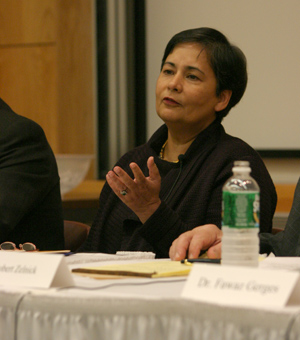Asma Barlas, professor of politics, will spend next spring at the University of Amsterdam as the Spinoza Chair, an honorary position in the university’s philosophy department.

Barlas, also director of the Center for the Study of Culture, Race and Ethnicity, said after she delivered a public lecture in Amsterdam this past November, faculty from the University of Amsterdam approached her and asked if she would be interested in the position. After she returned to the college and submitted samples of her research and course offerings, Barlas was formally offered the position for the Spring 2008 semester.
The Spinoza Chair is named after 17th-century philosopher Baruch Spinoza, who was excommunicated from the Jewish community of Amsterdam for his radical views. Barlas said though the position is named after a philosopher, its purpose is to attract people from all different fields to the position.
Other scholars who have served as Spinoza Chair include Richard Rorty, professor emeritus at Stanford University; Hilary Putnam, professor emeritus at Harvard University; and John Dupre, a professor of philosophy of science at Exeter University.
Barlas said she is the first Muslim and the first Muslim woman to hold the position.
“To me, that’s quite a landmark,” Barlas said.
Barlas said she has several responsibilities as the Spinoza Chair, including giving public lectures, teaching graduate courses and leading faculty seminars. Barlas said public lectures are unusual for an academic appointment.
“If you were to invite a professor over to Ithaca College, I don’t know if [the college] would impress upon them the need to give public lectures to the community, as well,” Barlas said.
Barlas also said she would have the space to continue her own research and share it with the faculty in Amsterdam.
“It’s a way to provide a community dialogue on what one might be doing,” Barlas said.
Barlas said she will teach the same Islam course to graduate students in Amsterdam that she teaches to undergraduates at the college. The course examines Islam from both religious and political perspectives, Barlas said.
“It’s not just a course in theology, it’s not simply a course in Muslim history, it’s not a course on Muslim politics,” Barlas said. “It’s kind of trying to look at the intersections of all three.”
Frederik Kaufman, chair of the college’s philosophy and religion department, said by giving Barlas the chair, the philosophy department at the University of Amsterdam was taking a creative approach to filling a seat named after Spinoza, who was Jewish, and addressing the growing number of Muslims in Amsterdam.
“They are trying to address the tension between Muslim and non-Muslim communities,”
Kaufman said.
Zillah Eisenstein, a politics professor at the college, said she thinks it’s a great honor when faculty at the college — especially Barlas — are recognized elsewhere.
“Everyone she interacts with will be better for it,” she said.







